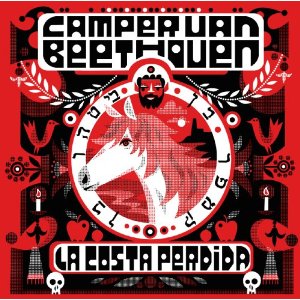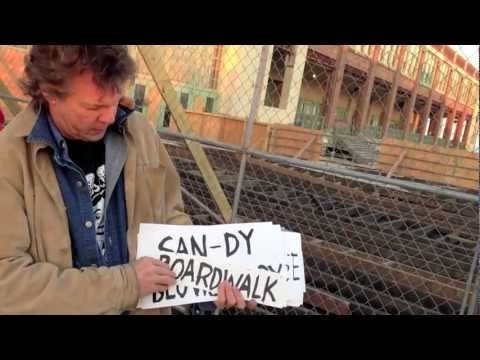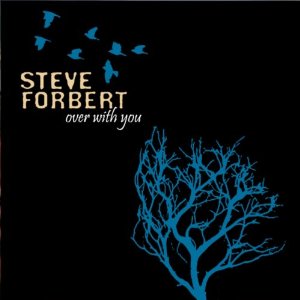
A Conversation With David Lowery
Mike Ragogna: Hey There, David, how are you today?
David Lowery: I'm very good, Michael. How are you?
MR: I'm pretty good. So, you've got a new Camper Van Beethoven album, La Costa Perdida. What went into this project?
DL: Well, Camper hadn't done a new record since about '06 or '07. We reformed and made and album, which was great, back in '04. We were always ready to get started on the next one, and for whatever reason we just never got around to it. We played a lot of shows, but we just never really got around to it. We had a show at The Henry Miller Library in Big Sur, California, where we were supposed to play our classic album, Key Lime Pie, from '89, but it got rained out, so they just postponed it a week. We didn't have a lot to do for that week, so we just kind of hung out, and every evening Greg (Lisher) and Victor (Krummenacher) would come over to Jonathan (Segel)'s house and we'd work on songs. We had a couple of songs started, but the majority of the music for this album came together during that week.
MR: And Chris Pederson and Michael Urbano are with you on this too, right?
DL: Chris plays drums. We sent the files to him in Australia--we never actually saw him. Michael Urbano did most of the work with us developing the record and a lot the tracking, but Chris plays on two tracks as well.
MR: What was the writing process like?
DL: Well, it's mostly how we do all the Camper Van Beethoven records, which is fairly collaborative. Every once in a while we'll bring in songs that are more or less finished, but usually what people bring in are just little snippets and riffs, so we just flesh it out. We did about thirteen tracks that week. We actually listened to the demos and ended up releasing four of those tracks as extra tracks or something like that. It was really cool, it had this kind of bite to it.
MR: Now, the name of the album is La Costa Perdida, which translates to "the lost coast of California," right?
DL: Yeah, the lost coast, which is a very specific geographic region where the coast is too rugged and there are no roads over there. It's a fascinating little area. People will refer to something culturally as "the lost coast," which is pretty much the entire coast above San Francisco and the adjacent towns. Two things about that area that is important is that when the hippies kind of dropped out of San Francisco, they just kind of went up the coast, and then part of that refers to the marijuana industry in California. Culturally, if you want to get something done up there it's kind of hard sometimes because there is just a general flakiness. You're sort of in this land of the lost--this lost hippie republic. We started this album down in Big Sur, which is similar culturally--it's like the cousin to the lost coast--so, that's why.
MR: From your perspective, what is the difference between your three major musical outlets--Camper Van Beethoven, Cracker, and your solo work?
DL: Because I'm in both bands, it's easier to talk about the differences than the similarities. If I wasn't in both bands I think we'd talk about the similarities because both share this sort of eclectic way looking at rock. Cracker takes a little of this and that and kind of mixes it up with rock, Camper Van Beethoven takes a little of this and that and mixes it up with rock. The "this and that's" are a little different between the two bands, but if you really wanted to generalize, Cracker is a little more about the emotion, heart, and soul, and Camper Van Beethoven is a little more about the head; it's a little more thinky. I don't sing all the time in Camper, and there is quite a bit of concentration going into those guitar parts I'm playing even though I'm just playing rhythm guitar because things change a lot. So, I have to be a little more intellectual in the way that I play in that band.
MR: Can you tell me how you came to write "Too High For The Love-In"?
DL: Well, it's actually based on two different stories. I had a friend in college who took some hallucinogenic, and when he got back to his cottage kind of down by the harbor in Santa Cruz, somehow a large sea bird had gotten into his kitchen. He was really high, and the bird was completely freaked out, flapping around and making all kinds of noise. It was just a complete bad experience for him--you come home kind of tripping and there's this angry bird in your kitchen. The second story is something that happened around the time that we were working on this album. Jonathan's wife is from Sweden, and they were having a baby, so they went to Sweden to have their baby, right? They ended up out in the country, on the old family farm in Sweden, and she was just kind of walking around and she got bit by a viper. First the local ambulance came to get her and then they broke down, then they managed to get her to the little country hospital, but they had to fly in the anti-venom and they flew it to the wrong place. It ended up to where she almost died--not to tell a dark humor story--but it all ended up okay, and she was fine. It was kind of like a little The Who mini rock opera that we were doing for that song. So, it was two unrelated things.
MR: What's the story behind "Northern California Girls"?
DL: Well, it all ties back to that concert at Big Sur that was postponed. There is a Beach Boys album called Holland, which is a strange little record. It's one of these albums which was an odd album for the band--it got mixed reviews and has a mixed legacy. We always liked that album, and since we were playing at Big Sur--that album was sort of part of their Big Sur period, or Northern California period--we became attached to that album again. So, the Beach Boys were very much something we were listening to as we were driving around those couple of weeks, and Greg had that beautiful guitar riff. It was a thing about the Beach Boys, so it was "Northern California Girls" instead of "California Girls." It started as just sort of a joke--making the other guys laugh--but then we were like, "We could really do this." So we did.
MR: And there's "Someday Our Love Will Sell Us Out."
DL: There is a really specific theme to that. That's a love story that is a forbidden love between two army people--I'm not really clear--they're either two army or intelligence people, and they can't let anyone know that they have this affair. That's partly because of this little obscure piece of American history that no one really knows about. If you go just North of Big Sur to Monterey, they have these two little defense institutes there. There is the Naval Post Graduate School, and then there is The Defense Language Institute. So, you go out to play in Monterey on a Friday or Saturday night and you're kind of like, "What is this?" It's like the place is filled with CIA officers or something like that. It's just an odd town. So, that's sort of where that came from.
MR: What advice do you have for new artists?
DL: Well, I teach at The University of Georgia the finance and economic part of the musical business, and we focus a lot on--really the one consistent thing between successful individuals or bands is that they produce lots and lots of songs and recordings. It's kind of like a lottery, so the more times you record songs, the more times you write songs, and the more times you perform--really that's the only thing that increases your chance of being successful. You still have to have your heart and your mind in the right place, but you're going to fail a lot before you are actually successful. I know that sounds like totally generic advice, but I feel like everybody I know that is successful has that proper attitude and was willing to fail a whole lot before they succeeded.
MR: What else do we need to know about this album that we haven't touched on yet?
DL: We'll be out playing shows this Spring and Summer.
MR: Is there another Cracker album on the horizon or maybe another David Lowery album?
DL: There will be another Cracker album, yeah. We did all this work for La Costa Perdida about fifteen months ago. So, kind of what we're doing now is playing shows and also writing for a new Cracker record, which will be the next thing that follows.
MR: Any words of wisdom?
DL: Never sell your publishing.
MR: Oh, that's good.
DL: Thanks.
Tracks:
1. Come Down The Coast
2. Too High For The Love-in
3. You Got To Roll
4. Someday Our Love Will Sell Us Out
5. Peaches In The Summertime
6. Northern California Girls
7. Summer Days
8. La Costa Perdida
9. Aged In Wood
10. A Love For All Time
Transcribed by Ryan Gaffney

(photo: preview of video)
"THERE'S NEVER GONNA BE ANOTHER HURRICANE NAMED 'SANDY,'" SINGS STEVE FORBERT
There's a new video titled "Sandy" that features singer/songwriter/activist Steve Forbert in Asbury Park raising awareness about the storm and its aftermath. "As a songwriter that is sometimes in the folk vein, after the hurricane happened and it was all sinking in, trying to process it, it just occurred to me if you're any kind of songwriter, you've got to write a song about this storm," says Mr. Forbert. "For some reason, I decided to not go with the lengthy narrative type ballad form. I have done that in the past with 'The Oil Song' and 'Set The World Ablaze,' where you almost try to do a journalistic report on the situation. This time, I just felt inclined to go with something a little more impressionistic built around the chorus and the 'build again' middle eight. So instead of nine minutes, it's only three minutes long, this one."
Hmmm. Anyone else remember a certain Asbury Park's Sandy with the aurora rising behind her? And doesn't it seem like only yesterday when Little Stevie Orbit was a party guest in Cyndi Lauper's "Girls Just Want To Have Fun" promo clip? And did I mention how there's never gonna be another hurricane named "Sandy"? Okay, I'll stop, just watch...wait, one last thing, you can download the song from Steve's website, http://steveforbert.com. Now watch.
The song's not on Steve's latest album, Over With You...ahem...but here's the album cover in case you were curious about what else Orbit's been up to.

